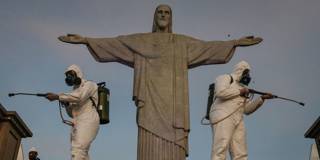If Latin America’s COVID-19 public-health shock is followed by a protracted economic crisis that leaves many people behind, trust in government and institutions will suffer, and politics will become even more fractured. In that case, the region could yet face a pandemic of instability and hopelessness.
BOGOTÁ/BUENOS AIRES/LONDON – Many regions performed badly when confronted with COVID-19, but Latin America fared worse than most, in terms of both lives and livelihoods lost. As of November 2020, nine of the 20 countries with the highest number of COVID-19 deaths per capita were in Latin America. The International Monetary Fund expected the region’s output to drop by 8.1% in 2020, with only the eurozone suffering a bigger regional decline. As a result, almost 15 million more Latin Americans will live in extreme poverty.
The first explanation for the region’s underperformance that comes to mind is poor leadership. Brazilian President Jair Bolsonaro initially claimed that the pandemic was a media trick. Mexican President Andrés Manuel López Obrador denied for weeks that the coronavirus was a threat and continued to hug and shake hands with supporters, only to reverse course suddenly and impose a strict lockdown. But even in those countries that acted early, containment measures were ineffective at reducing the number of COVID-19 cases. Argentina and Peru, which locked down hard, and Chile and Colombia, which followed a more flexible approach, ultimately suffered similarly dismal health outcomes.
That was partly because Latin America’s starting point was far from ideal. Too many people had pre-existing health problems, and the prevalence of multigenerational living arrangements facilitated contagion and infection of those most at risk. Large informal labor markets made lockdowns hard to enforce. A high incidence of face-to-face jobs, including in retail sales, and a scarcity of remote work opportunities (owing to poor connectivity and low digital literacy) didn’t help, either. Government ineffectiveness left health systems unprepared, despite early lockdowns that postponed the contagion peak.

BOGOTÁ/BUENOS AIRES/LONDON – Many regions performed badly when confronted with COVID-19, but Latin America fared worse than most, in terms of both lives and livelihoods lost. As of November 2020, nine of the 20 countries with the highest number of COVID-19 deaths per capita were in Latin America. The International Monetary Fund expected the region’s output to drop by 8.1% in 2020, with only the eurozone suffering a bigger regional decline. As a result, almost 15 million more Latin Americans will live in extreme poverty.
The first explanation for the region’s underperformance that comes to mind is poor leadership. Brazilian President Jair Bolsonaro initially claimed that the pandemic was a media trick. Mexican President Andrés Manuel López Obrador denied for weeks that the coronavirus was a threat and continued to hug and shake hands with supporters, only to reverse course suddenly and impose a strict lockdown. But even in those countries that acted early, containment measures were ineffective at reducing the number of COVID-19 cases. Argentina and Peru, which locked down hard, and Chile and Colombia, which followed a more flexible approach, ultimately suffered similarly dismal health outcomes.
That was partly because Latin America’s starting point was far from ideal. Too many people had pre-existing health problems, and the prevalence of multigenerational living arrangements facilitated contagion and infection of those most at risk. Large informal labor markets made lockdowns hard to enforce. A high incidence of face-to-face jobs, including in retail sales, and a scarcity of remote work opportunities (owing to poor connectivity and low digital literacy) didn’t help, either. Government ineffectiveness left health systems unprepared, despite early lockdowns that postponed the contagion peak.